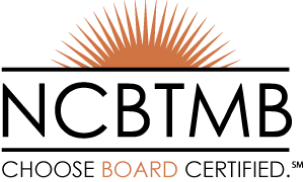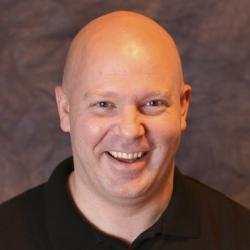How did you discover the massage therapy profession?
I was working as a store manager for a popular furniture rental company, and saw an advertisement for a local school that promised to introduce me to a way to help a lot of people improve their qualities of life. I moved into a ‘temporary’ position with a popular car rental agency for the year it took me to attend the night class of the massage therapy program, with full and fully-expressed intentions of moving into my new career immediately following graduation. As I attended the courses, they became more of a career-based foundation on which I would spend the next 17 years (and counting!) paying forward the promise the school originally made of the opportunity I would have in a massage therapy career. It was out of a need to “do more” with my life, and my successes with people on an individual, albeit microscopic, basis, as to apply my mind to my work and see physical-world, positive outcomes.
How did you develop your passion into a career?
I think my desire to have a positive effect on people—all kinds of people—led me into learning the gamut of what massage therapy and bodywork really encompass. After completing my 815.5-hour program, I was employed with the 5-Star & Fortune 500 company, The Ritz-Carlton, working in a spa environment; I became Registered as an International Institute of Reflexology practitioner; traveled to Thailand with a colleague to complete a 90-hour program in Chiangmai…all the while building, very slowly and deliberately, my sole-proprietorship’s clientele into what I have today. These multi-cultural and-socioeconomic experiences really contributed to what-I-think-is a well-rounded practice: able to serve any body that I work with on my table. There are STILL so many things for me to experience as a massage therapy professional, and my licenses and clients allow me to be able to fulfill my daily mantra of assisting others in achieving their health and wellness goals.
How has your career evolved?
These days are really a culmination of extensive opportunities to interact with my colleagues, peers, and students just entering the field that I embraced—being an organizer in several large groups since 2007 has improved and honed my skill to assist others in a most-efficient and effective way.
I have been an ACCET-/COMTA-approved Instructor at my alma mater—giving back to my local massage therapy community. I have written National Certification Exam questions for the NCBTMB, served the Massage Therapy Foundation in several volunteer committee positions, and served—since 2006 to this very day—on the national and state levels of organization for the American Massage Therapy Association. I write regularly for my clients (although I’d like it to be more often!) and consult with practitioners in the Las Vegas area to improve their own sole-proprietorships in the market. I am also working with Educated Touch as an Approved Instructor for its ethics and business/marketing courses and, of course, working with my clients to improve their qualities of life.
What does Board Certification mean to you?
Board Certification is a personification of all things good in the massage therapy professionals that subscribe to its Code of Ethics, Standards of Practice, and on-going educational and professional requirements to be a Certificant. I think that a common ground on which a profession can stand, like a professional credential, is critical for building and maintaining trust.
Doctors, the Public, media outlets, legislators and educators need a solid place to come to, refer to, or depend on for quality theory and practice information regarding massage therapy—I think the NCBTMB in their Board Certification credential provides ‘the walk’ for all the talk of professing how and that massage therapy improves health.
Practitioners in the field need the support of an organization, like the NCBTMB, when it comes to efficacy of the information and the foundation for the delivery of the techniques used to manipulate their clients’ soft tissue—we Certificants can’t just go out there and use the seal without believing in the tenets, fulfilling the requirements, and agreeing to be held accountable to the NCBTMB’s Code and Standards. Those practitioners that hold the credential have many things going for them when in the field – “I have more consumer confidence” is probably the best way I can express the meaning of Board Certification to me. When we, as practitioners, speak our expectations of ourselves to our clients—by holding important and forward the NCBTMB credential and all it stands for—then we are holding ourselves accountable to the trust of our clients that is such a fragile, precious thing.
What does the future hold for you?
Haha! Who knows..?! As far as I can see (which is usually about 2 weeks out), my clients’ good health and wellness are priority – I don’t really see an end to playing my part in serving others’ massage therapy goals.
I also see myself working more in the education field of massage therapy—client and practitioner education—and more-so with Educated Touch to bring a stronger sense of the mind/body connection in practitioners, when it comes to their applying their vision, ideas, knowledge, and massage therapy and bodywork expertise to their practices.
Making sure I am healthy so that I can assist them is another one of my long-term goals. Running and eating better [“than I used to”, which is an every-day challenge!], making more time for family and friends IRL (In Real Life), and finding and acting on creative ways to help others are some of my specific, long-term and future plans.
How do you hope to see the massage therapy and bodywork profession evolve?
We’ve got a long, long way to go before being completely understood and embraced by the healthcare profession, accepted by the general public as more than “a happy ending” at worst and “a luxury” at best…and being recognized as a profession with a safety-regulated set of skills to offer the public in its own jurisdictional legislation.
Fewer opioids being prescribed is a great start to a symbiotic relationship with allopathic methods of healthcare – Pain Management is, and has been for some time now, our introduction into the medical arena. Integration of massage therapy programs into sports, palliative care, and sub-acute (even acute, in places) medical procedures are all on their ways to being the foundation of the history of massage therapy [in the U.S.] – and, to me: having solid credentials evident and visible in the field, accountable experiences & expertise, and legislatively- and professional-supported outlooks for efficacy in keeping massage therapy in the areas of health and safety is the strongest position in which the massage therapy and bodywork profession can be. I am very hopeful for the massage therapy and bodywork profession – it is the concerted ability to stay focused and on course, of the professionals that lead the organizations that is the challenge and the measure of its success.
David is a Licensed and Board Certified Massage Therapist, and the owner of Hands in Motion. To learn more, please visit https://handsinmotion.info/.

